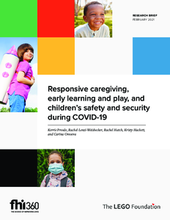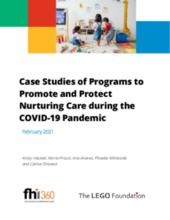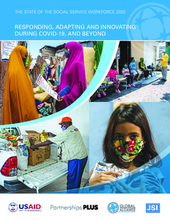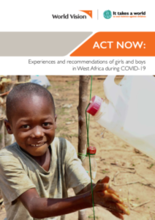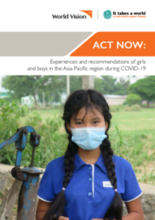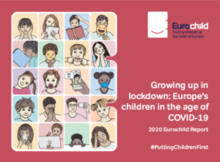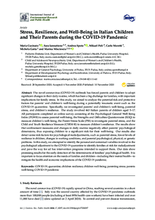This section includes resources for promoting nurturing care and positive development for children during the COVID-19 pandemic. Resources include those that offer guidance for parents and caregivers who are caring for children during lockdowns and quarantines who do not have access to schools and other services.
Displaying 11 - 20 of 128
This rapid review takes stock of emerging research on nurturing care for young children during the COVID-19 crisis.
This Case Study Report, prepared in partnership with World Health Organization (WHO) and the LEGO Foundation, describes the implementation experiences and emerging lessons of COVID-19 response strategies of seven programmes that prioritize nurturing care and early childhood development (ECD) in their work.
This briefing paper - developed by UNICEF and the Social Policy Research Institute, in collaboration with the National Development Planning Commission - built on existing microdata, analyses of children’s vulnerabilities and specific phone survey data collected between March and June 2020. The paper outlines the primary and secondary impacts of COVID-19 on children in Ghana, including the impacts on vulnerable children such as children with disabilities, street-connected children, and children in residential care.
Drawing from a review of global reports and case studies, as well as from information sourced from Global Social Service Workforce Alliance members, this report explores the key challenges social service organizations and workers have faced since the beginning of the pandemic and showcases how they have been able to adapt and innovate in response to such challenges.
This report sets out the findings from the most comprehensive study of attitudes towards bringing up children from conception to 5 years ever undertaken in the United Kingdom.
This report explores children and young people’s views and experiences related to COVID-19 and its indirect impacts. Firstly, it looks at children and young people’s perceptions of how COVID-19 has had an impact on their lives and countries.
This consultation explores children and young people’s views and experiences related to COVID-19 and its secondary impacts.
This report reflects on the effects of the coronavirus pandemic on children. It compiles information gathered from 25 countries across Europe, and provides recommendations for improving public policies in the short and long-term to support better outcomes for children and families, including children in alternative care or at risk of separation.
The authors of this study conducted a large-scale cross-sectional population study of Hong Kong families with children aged 2–12 years. Parents completed an online survey on family demographics, child psychosocial wellbeing, functioning and lifestyle habits, parent–child interactions, and parental stress during school closures due to COVID-19.
In this study, the authors aimed to analyze the potential risk and protective factors for parents’ and children’s well-being during a potentially traumatic event such as the COVID-19 quarantine.

